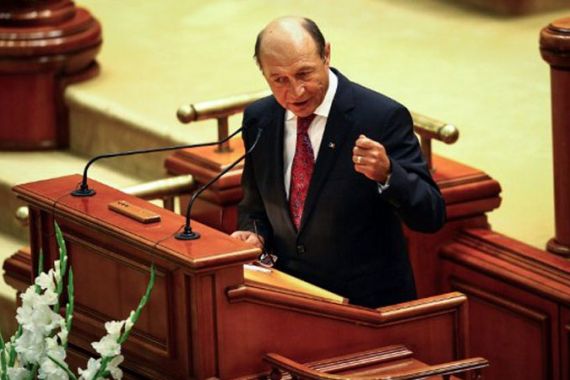Romania ruling could save leader from ouster
Court rules that a majority must vote in popular referendum in order to remove impeached President Basescu from office.

Romania’s Constitutional Court has said a majority of the electorate must turn out to vote in order for a referendum on ousting the president to be valid, a ruling that may make it harder for Traian Basescu’s opponents to sack him.
The court’s decision on Tuesday is the latest development in a growing power struggle in Romania between factions loyal to Basescu and those supporting his rival, Prime Minister Victor Ponta.
The wrangling has led to international concern over rule of law and democracy in the country, which joined the European Union in 2007.
Last Friday, parliament, which is dominated by Ponta backers, voted to impeach Basescu, accusing him of meddling in affairs that are the province of the prime minister, trying to influence judicial affairs and making bigoted remarks about Gypsies and disabled people.
Basescu has denied any wrongdoing, saying that he may be outspoken but that he has not committed “grave violations” of the constitution.
On Monday, the Constitutional Court upheld the decision to impeach, setting the stage for a July 29 national referendum on whether Basescu should be removed from office.
Majority required
The Constitutional Court had been asked by the opposition to rule on the legality of a new law which would have made it
easier to vote Basescu out – requiring only a majority of those voting in a referendum to impeach the president.
But following Tuesday’s ruling, a majority of the whole electorate would be required and getting a 50 per cent turnout of the electorate is by no means a certainty in Romania.
According to the most recent census, there are 18 million potential voters in Romania, meaning at least 9 million would have to vote.
Ponta’s government said it will comply with Tuesday’s court ruling.
Meanwhile, the prime minister has been asked to visit Brussels on Thursday to discuss his country’s political turmoil with European Union officials.
EU officials have questioned the speed with which Romania’s Constitutional Court upheld the impeachment and want Ponta to explain the situation.
“We are concerned by the speed and consequences of decisions taken over the last few weeks,” EU spokeswoman Pia Ahrenkilde Hansen said.
Basescu became president in 2004, and was impeached in 2007 but survived a referendum. He is a centre-right politician, though as president he is not allowed to be a member of any party.
Unlike presidencies in some European nations, Basescu’s position is not merely ceremonial. He is elected in a popular vote and is in charge of foreign policy, the powerful intelligence services and the country’s defence policies.
Ponta’s popularity dented
Ponta heads the left-leaning Social Democratic Party. He became prime minister on May 7, the third in four months after the previous two were ousted over unpopular cuts to spending and other economic austerity measures.
Unlike his predecessors who were deferential to Basescu, Ponta has moved instead to sideline Basescu and his allies.
The coalition of Social Democrats and Liberals led by Ponta did very well in June local elections, but Ponta’s popularity has declined after he was accused of plagiarising large sections of his 2004 doctoral thesis, accusations subsequently upheld by a Romanian academic panel.
Ponta, 39, has conceded that he did not credit his sources in footnotes, leaving the credits to the bibliography, but he claims the accusations are politically manipulated by Basescu.
The latest political turmoil has also dented his government’s popularity.
Basescu, 60, a former sea captain, has become increasingly unpopular in recent years due to the imposition of austerity measures and also his confrontational style.
But some believe he has been treated unfairly by the heavy-handed impeachment process.